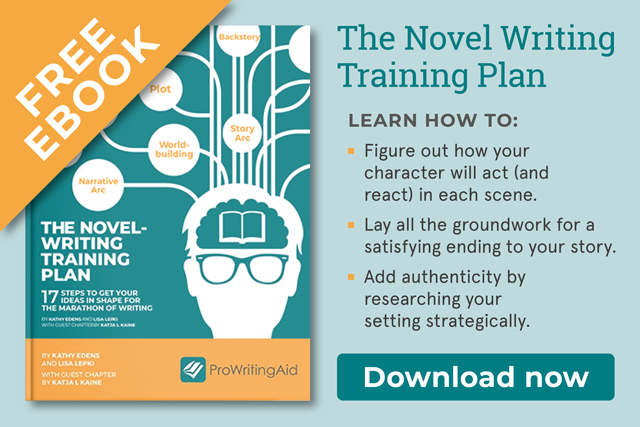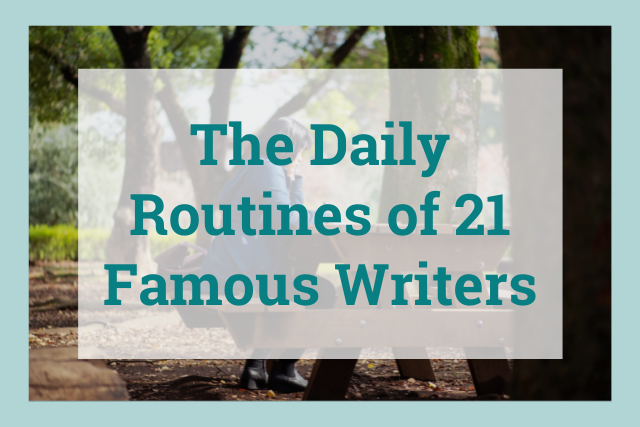
Anyone who wants to be a writer knows the depressing feeling of planning a whole day’s writing only to end up staring at a blank page, browsing online for "research," taking endless trips out for coffee, before finally giving up by about lunchtime.
At that point, it’s normally time to speculate (a) that you need new fancy stationery, or (b) that you need to change your productivity software.
Procrastination isn’t unique to writers, but what is unique is the idea that you can’t just knuckle down and get on with it. Instead, many of us feel you need to find a way of grasping that elusive muse before you can start to write.
But is this true, or is it just a myth to avoid putting in the hard yards? In this article, we’ll explore that myth by looking at the writing routines of famous authors and the old argument of inspiration vs. perspiration.
Is It Best to Write in the Morning?
Technique 1: Start Early
Unfortunately—and there’s no getting around this—a brief survey of the routines of great writers indicates that getting up early is often essential to success. Many believe that there is something magical in that first hour or two, and they go directly from their beds to their writing.
Salman Rushdie, for example, believes that he has a little package of creative energy that he has nourished through sleep and that should be used instantly on waking—so he walks to his office in his pajamas to write. Meanwhile Steven Kotler, bestselling author and expert on human performance, has noted that his ideal morning routine is to:
"Go from bed to desk before my brain even kicks out of its Alpha wave state."
It is a view that has been shared by some of the greatest writers of the twentieth century.
Ernest Hemingway
You’ve probably heard of Ernest Hemingway’s technique of writing right up until a point where you know what will happen next, and then stopping. Theoretically, this means that you’ll always know when to write next when you sit down at your desk the next day.
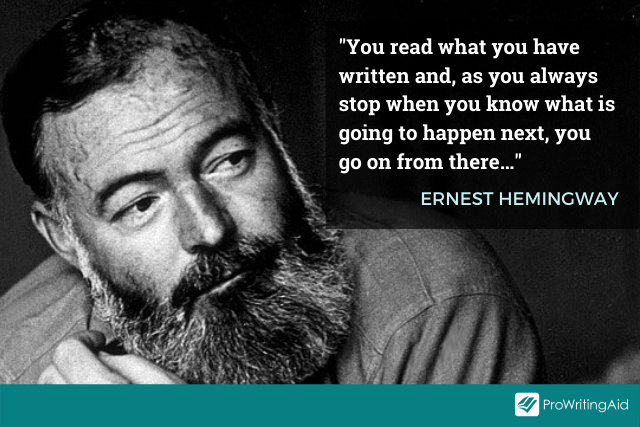
"I write every morning as soon after first light as possible. There is no one to disturb you and it is cool or cold and you come to your work and warm as you write. You read what you have written and, as you always stop when you know what is going to happen next, you go on from there… You write until you come to a place where you still have your juice and know what will happen next and you stop and try to live through until the next day when you hit it again.”
Toni Morrison
Nobel Prize-winning author Toni Morrison spoke in a 1993 interview with The Paris Review on realizing that she was more clear headed and open to writing before the sun rise:
"I always get up and make a cup of coffee while it is still dark—it must be dark—and then I drink the coffee and watch the light come… And I realized that for me this ritual comprises my preparation to enter a space that I can only call non-secular."
Do You Need a Writing Routine?
Technique 2: Eat, Sleep, Write, Repeat
For most successful writers, getting up early is an essential part of a larger necessity—a fixed daily routine. As the following authors will show, most see the routine as essential to provoking creative output.
W.H. Auden
Auden, one of the greatest (and most prolific) poets of the twentieth century certainly believed that "routine, in an intelligent man, is a sign of ambition" and followed a strict routine himself his entire working life.
Auden saw a strict schedule as a way of controlling the muse and wrote solidly from 7am to 11.30am every day without fail. He allowed himself a brief lunch before working into the late afternoon and then stopping every day at 6.30pm for cocktails and guests.
Isaac Asimov
Isaac Asimov, bestselling author of over 500 works of science fiction, followed a similarly regimented routine which he called his "candy-store hours" after the candy store that his father opened. That store opened at 6am and closed at 1am every day, year-round and Asimov worked the same hours:
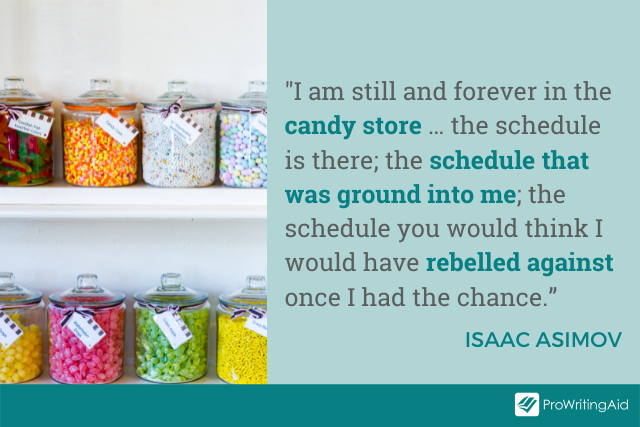
Derek Walcott
Speaking with The Paris Review, the writer Derek Walcott described his routine on his home island of St Lucia of waking up at 3:30am, having coffee and a cigarette, watching the sun rise, and then working through to 10am or 11am, as ritualistic:
"All artists and all writers in that moment before they begin their working day or working night have that area between beginning and preparation, and however brief it is, there is something about it votive and humble and in a sense ritualistic."
Stephen King
Stephen King, one of the most prolific and successful writers of all time, writes 1,000 words a day and sees his routine as a way of entering a "writing state":
"I have a glass of water or a cup of tea. There’s a certain time I sit down, from 8:00 to 8:30, somewhere within that half hour every morning. I have my vitamin pill and my music, sit in the same seat, and the papers are all arranged in the same places. The cumulative purpose of doing these things the same way every day seems to be a way of saying to the mind, you’re going to be dreaming soon."
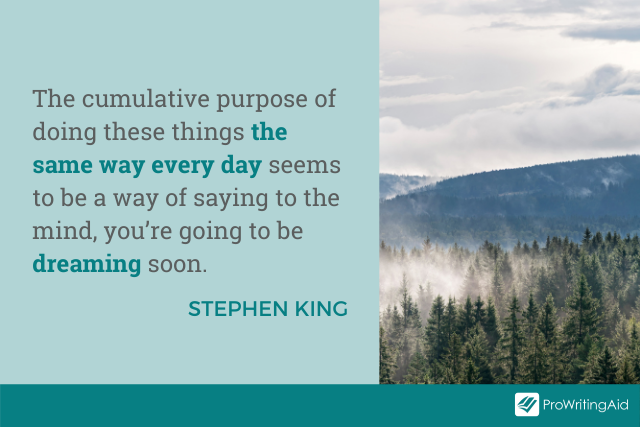
What Tools Do You Need for Writing?
Technique 3: Use Props
If you don’t believe in a dream state or a muse, just look on the use of repetition as an illusion or prompt to get you working.
Natalie Goldberg
In Writing Down the Bones, author Natalie Goldberg advocates the use of "props" to trick your consciousness into an altered state:
"When I sit down to write, often I have a cigarette hanging out of my mouth… I don't actually smoke anyway… The cigarette is a prop to help me dream into another world."
Other writers have props all around their office.
Will Self
When interviewed in The Guardian in 2007, author Will Self referred to the writing props he relies on:
"Rituals. Smoking—pipes, cigars, special brands, accessories, the whole bollocks. Coffee, tea, strange infusions—I have a stove on my desk. Fetishising typewriters, pens, etc."
(Just as a side-note, we’re not advocating taking up smoking here. Many of these twentieth-century literary giants didn’t know quite how bad it is for you—or else they didn’t care!)
Don DeLillo
Acclaimed novelist Don DeLillo uses a photo of another writer to force himself back to work:
"The face of Borges against a dark background… he’s like a shaman painted for visions… the photograph shows us a writer who did not waste time at the window or anywhere else. So I’ve tried to make him my guide out of lethargy and drift, into the otherworld of magic, art, and divination."
Is It Best to Write Alone?
Technique 4: Peace and Quiet
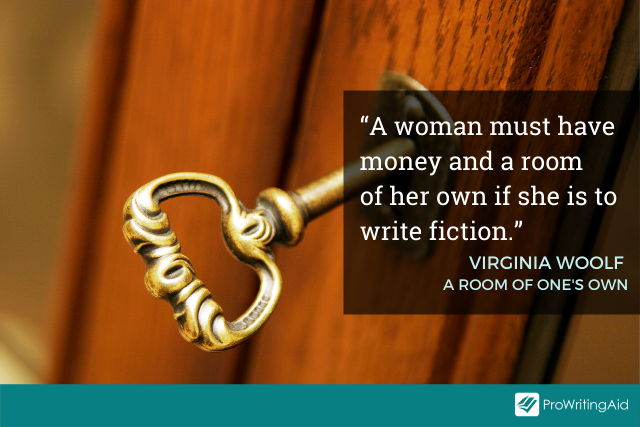
Virginia Woolf
Virginia Woolf famously wrote about the literal and figurative need for a space for women to write, and for many writers the best prop or routine is still the ability to go somewhere else to bring their ideas to life.
Maya Angelou
Writer and playwright Angelou rented a hotel room away from her house and all the noise, for months at a time as part of her routine:
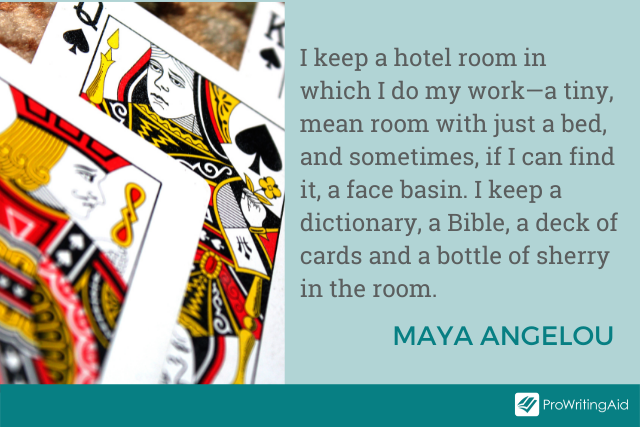
"I keep a hotel room in which I do my work—a tiny, mean room with just a bed, and sometimes, if I can find it, a face basin. I keep a dictionary, a Bible, a deck of cards and a bottle of sherry in the room. I try to get there around 7, and I work until 2 in the afternoon. If the work is going badly, I stay until 12:30. If it’s going well, I’ll stay as long as it’s going well. It’s lonely, and it’s marvelous."
Joan Didion
Joan Didion told The Paris Review in 1968 how she had to return home when a book was near completion:
"Another thing I need to do, when I’m near the end of the book, is sleep in the same room with it. That’s one reason I go home to Sacramento to finish things. Somehow the book doesn’t leave you when you’re asleep right next to it. In Sacramento nobody cares if I appear or not. I can just get up and start typing.”
How Many Words Should I Write in a Day?
Technique 5: Set a Word Quota
For some writers the rigors of a schedule are not enough—they go further and set themselves a word quota!
Anthony Trollope
Trollope was an extremely prolific Victorian novelist who worked to an unbelievable level of discipline, waking at 5am and writing through to 8:30am with a watch on his desk and making sure that he wrote 250 words every 15 minutes without fail.
So dedicated was he that if he finished a novel in that time he would immediately start on the next one, sticking to the same, extraordinary schedule!
Alice Munro
In a 1994 Paris Review interview, Munro admitted to following a similarly compulsive schedule:
"I write every morning, seven days a week. I write starting about eight o’clock and finish around eleven. … I am so compulsive that I have a quota of pages. I’m also compulsive now about walking three miles a day, every day."
Compare Your Writing to Your Favorite Authors’
Your writing routine probably isn’t as extreme as some of the rituals we’ve seen so far, but how does your actual writing compare?
ProWritingAid’s Summary Report allows you to compare your writing to over 30 authors in several key areas like dialogue tags, emotional tells, sentence length variety, bad adverbs, and more.
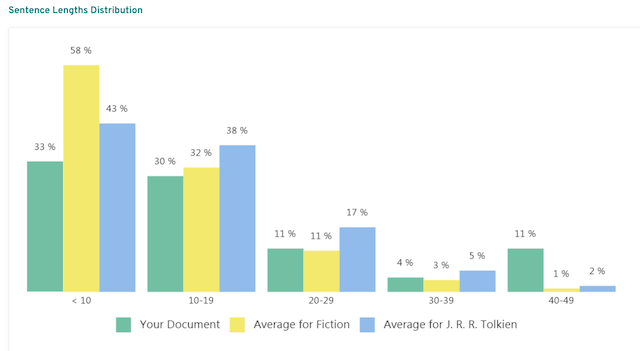
You don’t need to match the best authors in your genre in these areas to find success, but it’s useful to see how their writing breaks down technically to get a sense of the conventions of your genre.
See how your writing compares by signing up for a free ProWritingAid account.
Does Exercise Make You a Better Writer?
Technique 6: Exercise
Munro’s compulsion to walk highlights another extremely common factor in the successful routines of writers: exercise. Many authors express the desire to match mental and physical strength.
Charles Dickens
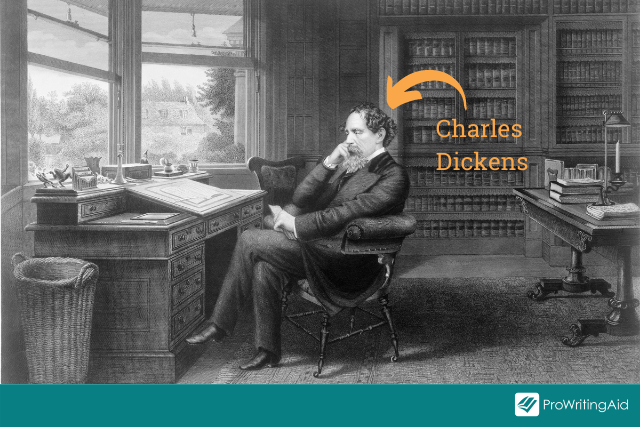
Dickens had a rigid writing routine and would be in his study by 8:30am every day. He would work through until midday for a brief lunch, after which he would work on till 2pm. Then, however, he would head out into the streets of London (or sometimes further afield into the countryside) trying to find what he described as "some pictures I wanted to build upon."
Kurt Vonnegut
In Kurt Vonnegut: Letters, the author wrote of the importance of exercise in his routine:
"I awake at 5:30, work until 8:00, eat breakfast at home, work until 10:00, walk a few blocks into town, do errands, go to the nearby municipal swimming pool, which I have all to myself, and swim for half an hour, return home at 11:45, read the mail, eat lunch at noon… I do push-ups and sit-ups all the time."
Haruki Murakami
Japanese author Haruki Murakami told The Paris Review of the importance of exercise in writing a novel:
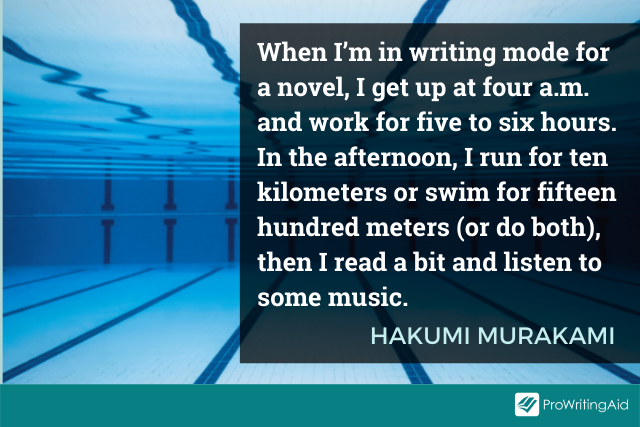
"When I’m in writing mode for a novel, I get up at four a.m. and work for five to six hours. In the afternoon, I run for ten kilometers or swim for fifteen hundred meters (or do both), then I read a bit and listen to some music. I go to bed at nine p.m. I keep to this routine every day without variation. The repetition itself becomes the important thing; it’s a form of mesmerism. I mesmerize myself to reach a deeper state of mind. But to hold to such repetition for so long—six months to a year—requires a good amount of mental and physical strength. In that sense, writing a long novel is like survival training. Physical strength is as necessary as artistic sensitivity."
Can I Be a Writer Part-Time?
Technique 7: Write on the Side
Of course, many people reading these routines will wonder how to fit that much writing into a day when you still need to pay the bills.
Franz Kafka
Anthony Trollope (mentioned above) once again puts us all to shame. That 250 words every fifteen minutes that he wrote between 5:30 and 8:30 in the morning? It was before he went off for the day and worked for the postal service! And Franz Kafka famously didn’t start work until 23:00 when he had finished a long day working for an insurance company. So no excuses on that front!
Is It Better to Write in the Day or at Night?
Technique 8: Write at Night
Thankfully, not every writer in history has stuck to disciplined early-morning routines! The history of literature is packed with gifted authors and playwrights burning the midnight oil.
And for some, particularly horror or fantasy writers, night is the only time to write.
H. P. Lovecraft
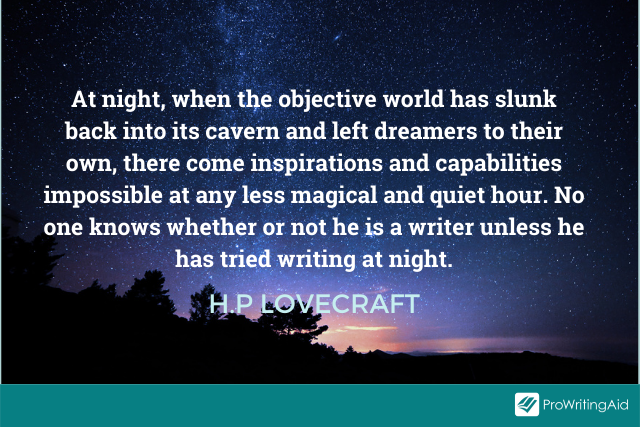
Technique 9: Get Comfortable
Lastly, just to counter all those spartan fixed daily routines, here are some writers who could only write under certain, rather more comfortable conditions.
Truman Capote
Speaking to The Paris Review in 1957, Capote noted that he could not think or write unless he was lying down:
“Either in bed or stretched out on a couch and with a cigarette and coffee handy. I’ve got to be puffing and sipping. As the afternoon wears on I shift from coffee to mint tea to sherry to martinis.”
Patricia Highsmith
Meanwhile, Patricia Highsmith did manage to work in the mornings, but as her biographer noted, did so in a very particular way:
“Sitting on her bed surrounded by cigarettes, ashtray, matches, a mug of coffee, a doughnut, and an accompanying saucer of sugar. She had to avoid any sense of discipline and make the act of writing as pleasurable as possible."—(Mason Currey, Daily Rituals)
The Importance of a Daily Writing Routine
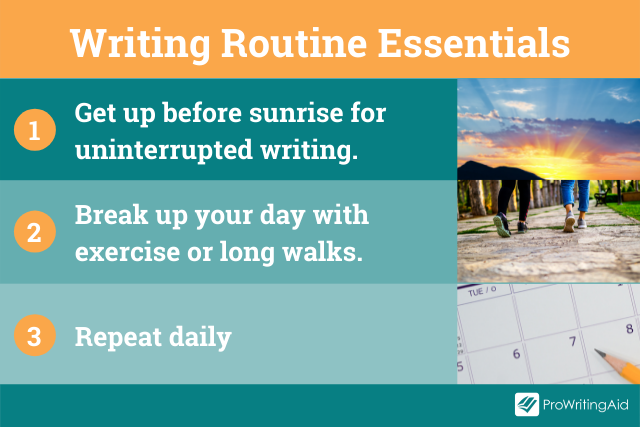
In the end, it’s not very romantic, but the main conclusion seems to be that you just have to do the work. Plumbers and accountants don’t get to sit around waiting for the plumbing or accountancy "muses" to arrive. And neither do writers.
Setting a routine and turning up seems to be the most important bit—you don’t need to be knocking out Shakespeare every time, just make sure you get some words down on the page.
These days, we may have the internet for research and ProWritingAid for editing, but for the writing itself, we still need to put in the hard yards ourselves. Do that, and eventually, all that perspiration should lead to inspiration!

